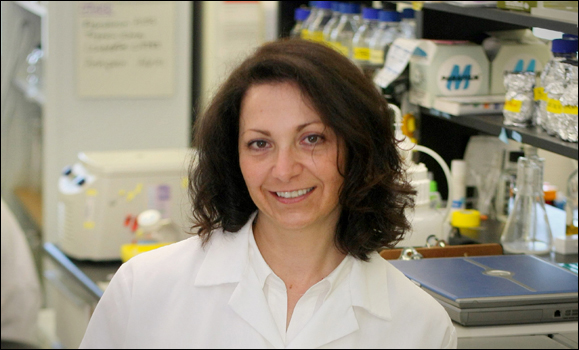Media Releases
» Go to news mainDal scientist discovers new drug combination that shuts down aggressive breast cancers
Scientists at Dalhousie Medical School have successfully tested a never-before-used combination of drugs that effectively shuts down aggressive, metabolically active HER2-positive breast cancers. These results are published in the current issue of the high-impact journal, Oncotarget.
Key Points:
Dr. Paola Marignani and her team tested two drugs – AZD8055 and 2-DG – and found that combining the two agents produced the most powerful anti-cancer effect. The drug combination effectively blocked growth signals to the tumours, while simultaneously knocking down energy production inside the cancer cells. As a result, both the size of individual tumours and the overall number of tumours was dramatically reduced after 21 days of treatment, to the point that the researchers faced difficulties finding tumours for analysis in some of the treated mice.
Each of the two drugs tested (AZD8055 and 2-DG) was significantly effective against metabolically active HER2-positive breast cancer on its own. Administering the two drugs together dramatically enhanced their cancer-killing effects. While both of these drugs are known (AZD8055 is being developed by Astra Zeneca and 2-DG is a common experimental drug), they have never been used in combination before in an animal model of cancer.
The scientists found that, by targeting very specific growth-signal and energy-production pathways in the HER2-positive breast cancer cells, the drug combination is able to effectively shrink tumours without harming healthy tissues.
Dr. Marignani and her team tested the drugs in their own mouse model of LKBI negative/HER2-positive breast cancer. Unique in the world, this model is based on the researchers’ 2009 discovery that a tumour suppressor protein known as LKB1 regulates estrogen receptors in breast tissue. By re-engineering HER2-positive mice so they do not produce LKB1, the scientists were able to develop a reliable and metabolically active model of HER2-positive breast cancer. This model produces cancer at a rate similar to how it develops in humans, within a specific, predictable time frame. This makes the model an extremely valuable tool for pre-clinical drug testing. About one-fifth of all breast cancers are HER2-positive; this is a particularly aggressive form of breast cancer that can be difficult to treat.
Dr. Marignani is now seeking support to move her discovery forward into early-phase clinical trials. Her current research is funded by private donations through Dalhousie Medical Research Foundation’s Adopt-a-Researcher program and grants from the Beatrice Hunter Cancer Research Institute and the Nova Scotia Health Research Foundation.
Pull Quotes:
"We are very excited that we’ve been able to use our own unique mouse model of spontaneous primary breast cancer, to test a novel drug combination that destroys tumours by turning down their growth signals and shutting off their power supply." -- Dr. Paola Marignani, associate professor, departments of Biochemistry & Molecular Biology and Pathology, Dalhousie Medical School
Images:
 |
Dr. Paola Marignani Photo Credit: Download Hi-Res image |
Resource Links:
Dalhousie Links:
Contacts:
- Allison Gerrard, Dalhousie Medical School, 902-494-1789, allison.gerrard@dal.ca
Recent News
- Media release: Nova Scotia pharmacists among Canada’s first to prescribe HIV prevention drug with help from Dalhousie pilot study
- Media opportunity: What do you need to make a hit song? Math, according to a Dalhousie University mathematician who created a pop song using fractals, the cantor set and all things mathy
- Media opportunity: Uncovering the link between meltwater and groundwater in mountain regions is a priority for sustainable water management: international research paper
- Media opportunity: Fish biomass faces steep declines by end of century under high‑emissions scenario: FAO report by Dalhousie University, international scientists
- Media Release: Two Dalhousie students selected as McCall MacBain International Fellows
- Media release: Barriers to care ‑ research reveals the experiences of transgender and gender‑diverse people seeking health care
- Media opportunity: Being involved in extracurricular activities really does matter when it comes to 'mattering': Dalhousie University research
- Media opportunity: Podcast by Dalhousie researcher and Halifax photographer looks at barriers to Nova Scotia's coastline, decreasing access to waterfronts and problems with litter, marine debris in public coastal areas
